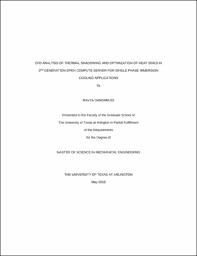
ATTENTION: The works hosted here are being migrated to a new repository that will consolidate resources, improve discoverability, and better show UTA's research impact on the global community. We will update authors as the migration progresses. Please see MavMatrix for more information.
Show simple item record
| dc.contributor.advisor | Dereje, Agonafer | |
| dc.creator | Dandamudi, Ravya | |
| dc.date.accessioned | 2019-07-08T21:53:46Z | |
| dc.date.available | 2019-07-08T21:53:46Z | |
| dc.date.created | 2018-05 | |
| dc.date.issued | 2018-05-24 | |
| dc.date.submitted | May 2018 | |
| dc.identifier.uri | http://hdl.handle.net/10106/28301 | |
| dc.description.abstract | In today’s networking world, utilization of servers and data center has been increasing significantly. Increasing demands of processing and storage of data causes corresponding increase in power density of servers. The data center energy efficiency largely depends on thermal management of servers. Currently, air cooling is the most widely used thermal management technology in data centers. However, air cooling is starting to reach its limits due to very high-powered microprocessors and packaging. To overcome the limitations of air cooling in data centers, operators are moving towards immersion cooling using different dielectric fluids. Thermal shadowing is the effect in which temperature of a cooling medium increases by carrying heat from one server and results in decreasing its heat carrying capacity due to a reduction in the temperature difference between the maximum junction temperature of successive heat sinks and incoming fluid. Thermal Shadowing is a challenge for both air and low velocity oil flow cooling and as such, both air and low velocity dielectric flow cooling technologies need to be optimized to get high energy efficiency. In this study, the impact of Thermal Shadowing between different Dielectric Fluids is compared. The results of dielectric fluids, Mineral Oil and Synthetic Fluid EC100 are compared. The heat sink is a critical part for cooling effectiveness at server level. This work also provides an efficient range of operation for heat sink with computational modelling of third generation open compute server. Optimization of heat sink can allow to cool high-power density servers effectively. A parametric study is conducted, and the thermal efficiency has been optimized. | |
| dc.format.mimetype | application/pdf | |
| dc.subject | Thermal shadowing | |
| dc.subject | Optimization of heat sinks | |
| dc.subject | White mineral oil | |
| dc.subject | Synthetic fluids | |
| dc.subject | Immersion cooling | |
| dc.title | CFD Analysis of Thermal Shadowing and Optimization of Heat sinks in 3rd generation Open compute server for single phase immersion cooling applications | |
| dc.type | Thesis | |
| dc.degree.department | Mechanical and Aerospace Engineering | |
| dc.degree.name | Master of Science in Mechanical Engineering | |
| dc.date.updated | 2019-07-08T21:53:47Z | |
| thesis.degree.department | Mechanical and Aerospace Engineering | |
| thesis.degree.grantor | The University of Texas at Arlington | |
| thesis.degree.level | Masters | |
| thesis.degree.name | Master of Science in Mechanical Engineering | |
| dc.type.material | text | |
Files in this item
- Name:
- DANDAMUDI-THESIS-2018.pdf
- Size:
- 1.623Mb
- Format:
- PDF
This item appears in the following Collection(s)
Show simple item record


